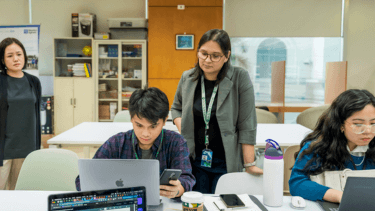Can an app make women safer in their commute?

Sponsored by

Sponsored by

Manila, Philippines, has one of the most dangerous transport systems in the world for women, with at least 80% of women commuters reporting harassment or sexual assault, according to a Thomson Reuters Foundation Report. This has prompted a team of De La Salle University researchers to turn to AI for a solution.
Philosophy faculty member and gender studies expert Dr. Hazel Biana found that technology such as safety apps exists but that the majority of these put the burden on women to protect themselves, with suggestions such as staying alert and traveling with weapons. Biana also found that existing apps do not tackle the underlying issues of violence against women or take into account the functions that women want. She wondered if it was possible to design a safety app that could empower women while being powered by women.
With colleagues at the DLSU Social Development Research Center, which includes Center Director and Psychology faculty member Dr. Homer Yabut, Philosophy faculty member Rosallia Domingo, and Sociology and Behavioral Sciences Professor Dr. Melvin Jabar, Biana focused on women transit users’ lived experiences and stated needs and the group soon came up with the SafeHer App.
“We found a call for submissions for AI-inclusive algorithms and AI- inclusive programs by the Feminist Artificial Intelligence Research Network, in cooperation with the Technologico de Costa Rica and the International Development Centre of Ottawa, Canada, and decided to submit a proposal for an artificial intelligence-driven application for women who are in transit. The proposal was approved, we got to work, and now we have SafeHer,” says Biana.
The project’s research reveals that women feel safe knowing they are in the company of other women. Hence, one of the most important features of SafeHer is that it lets the user know if there are other women commuters around them via the app’s live location-sharing feature. Its buddy system feature also allows women to detect other solo commuters.
Apart from these, the app has an SOS alert and scream detection feature. Other features for future development include best-route recommendations and crash detection.
“I think the difference that this project has from other artificial intelligence projects is that it began with thinking, really considering what women commuters need. It also integrates a lot of community interaction and is collaborative. We have a team of developers and UBX designers, psychologists, sociologists, and artificial intelligence experts working together on this,” Biana shares.
The app, which is in the prototype stage, had an alpha launch in 2023 and will undergo pilot testing in the coming months, where it will be deployed in areas around the University and the metro. The team is coordinating with government agencies, including the Philippine National Police, the Philippine Commission on Women, the Light Railway Transit Authority, and local government units, to address incidents of gender-based violence in transit systems.
Biana considers the project’s greatest challenges to be getting feedback from the community and keeping up with the ever-changing AI technology.
“We must ensure it’s integrated into the local government unit systems and existing infrastructure. Its development also needs to be fast because technology changes so quickly. While we’re developing the app, new technologies are coming up, so it’s really a race for time and to make sure that we’re up-to-date with the latest AI technologies,” she shares.
Overall, the app aims to empower women, challenge victim-blaming norms, and raise awareness of women’s safety concerns in transit. Ultimately, the SafeHer team hopes data from their app can be used to influence policies that make public transit safer for women.
This research work is part of the Incubating Feminist AI project of the f<a+i>r Feminist AI Research Network under the <A+> Alliance for Inclusive Algorithms carried out with the aid of a grant from the International Development Research Centre, Ottawa, Canada.
Contact: Dr. Hazel Biana | hazel.biana@dlsu.edu.ph